Article
Antony and Cleopatra
Antony
Mark Antony was born either in 86, 83, or 82 BC and came from the ancient and influential plebeian family of the Antonii, whose representatives participated in drafting the Law of the Twelve Tables as early as the 5th century BC. His grandfather, Marcus Antonius the Orator, was a consul and then a censor of the Senate. However, crises and turmoil did not spare the family—Orator was killed as a result of Marius's repressions because he sided with Sulla. Mark Antony's parents were forced to hide from persecution, which is why the exact place and year of his birth are unknown.
Antony's early years coincided with a relatively peaceful time after the war between Marius and Sulla. The young man was not lacking in beauty and physical form, possessed a bright charisma, and spent his youth in "drinking bouts, debauchery, and monstrous extravagance," as Plutarch wrote. For Romans, it was not a vice to indulge in passions in youth, but in adulthood, it was deeply condemned. Like any Roman aristocrat, Antony received a good education and, like his grandfather, excelled in oratory, which even his future enemy Marcus Tullius Cicero noted. However, while Cicero belonged to the conservative "Attic" school, which emphasized facts and precision, Antony belonged to the "Asiatic" school, which emphasized spectacle and clarity.
His high birth allowed Antony to take the position of cavalry prefect in the troops of the governor of Syria, Aulus Gabinius, where he commanded 400 to 500 cavalrymen. Together with Gabinius, he went to Judea, where he participated in suppressing a rebellion in the vassal kingdom. Antony captured the rebellious Jewish king Aristobulus II and his son, and for storming the fortress of Sartaba, he was awarded the honorary military decoration "corona muralis" ("mural crown"), given to the first soldier to climb the walls of a besieged city. Antony proved himself a talented commander and gained popularity among the soldiers, which he retained until the fateful Battle of Actium.
In 58 BC, in Egypt, Princess Berenice overthrew King Ptolemy XII Auletes, who then asked Rome for support. The Senate refused, and the king offered a huge bribe to the commander of the Roman troops, Gabinius. Going against the Senate was a risky venture, and Gabinius hesitated. Antony persuaded the commander to take the gamble, and in 56 BC, he invaded Egypt, defeated Berenice, and restored Ptolemy to the throne. Antony actively defended the local residents against the embittered Ptolemy and even buried Berenice and her husband with royal honors, earning the love of the Egyptians. In 54 BC, after his term ended, Gabinius returned to Rome, where he was convicted of disobeying the Senate and exiled. Antony managed to avoid prosecution.
Nevertheless, Antony had no desire to remain in Rome, and Gaius Julius Caesar, who needed talented commanders for the Gallic War, came to his aid. Antony accepted the offer. In Gaul, he served as a legate, commanding a legion and carrying out important assignments for Caesar. In 50 BC, Antony was elected a tribune of the people and represented the commander's interests in Rome. He attempted to veto the Senate's decision to declare Caesar an outlaw, but under threats of violence, he was forced to leave the Eternal City. In 49 BC, Caesar crossed the Rubicon, starting another civil war.
In the struggle against Pompey the Great, Antony enjoyed Caesar's special trust, who, after becoming dictator, appointed his associate as the cavalry commander, his deputy. In 48 BC, Antony participated in the decisive Battle of Pharsalus, where Pompey's forces were completely defeated. In his absence, the dictator entrusted Antony with governing Rome. Taking advantage of his high position, Antony began to live lavishly: he confiscated Pompey's villa and led a luxurious lifestyle while harshly managing the city, which, during the difficult time of civil war, provoked the anger of the Romans. Caesar realized that Antony was more of a hindrance than a help and temporarily fell out of favor. However, Antony's talents outweighed his shortcomings, and Caesar secured his election as consul. It was in this position that Antony faced the fateful Ides of March in 44 BC.
Antony was with Caesar on the day of the assassination. However, he was not in the Senate building at the crucial moment and failed to save the dictator from the numerically superior conspirators. The Caesarian camp rallied around Antony as the most prominent supporter of the dictator, and many insisted on executing Marcus Junius Brutus and Gaius Cassius Longinus. However, the new leader sought a truce with the conspirators, knowing about the republican opposition in the Senate.
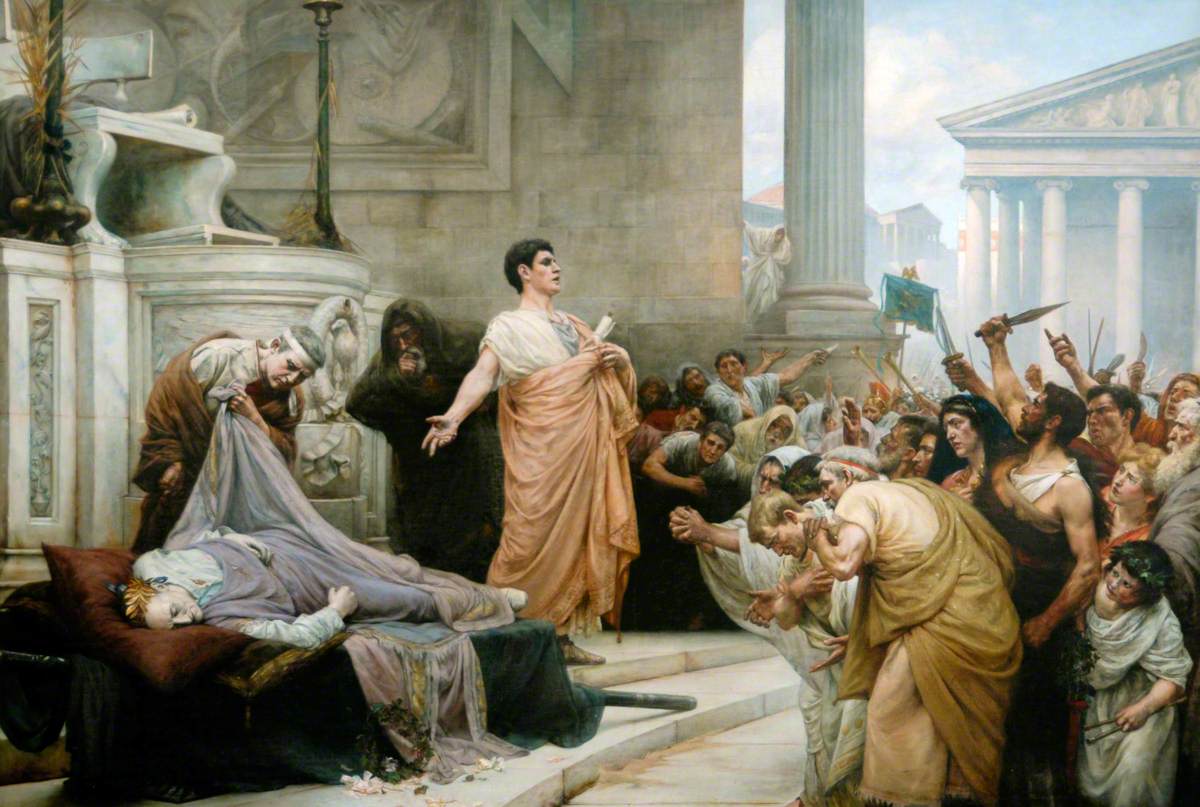
Only after consolidating forces did he enter into conflict with the Senate and Caesar's adopted son Octavian, but soon they united and, along with Lepidus, formed the Second Triumvirate to fight against the republicans and Caesar's assassins. Cicero was beheaded, and Brutus and Cassius met their deaths in 42 BC at the Battle of Philippi.
The Second Triumvirate divided the provinces of the Republic. Antony, as the leading figure, received the wealthy East with Gaul, and he departed to Cilicia on the southern coast of Asia Minor to restore order. For this purpose, in 41 BC, he summoned Cleopatra to confirm agreements between Rome and Egypt. At that time, Egypt was the largest of the Roman-subjugated eastern states, supplying grain to the Eternal City. Before meeting Cleopatra, Antony was already one of the Republic's leading figures and an outstanding commander, but his fate changed dramatically after becoming closely acquainted with the Egyptian queen.
Cleopatra
The last ruler of Ptolemaic Egypt was born at a very difficult time for her state. Hellenistic Egypt, once founded by Alexander the Great's general Ptolemy Soter, was in decline—constant infighting among Ptolemy's descendants led the country to heavy defeats by the Seleucid kingdom and dependence on Rome.
Cleopatra was born in 69 BC as the second daughter of the aforementioned Ptolemy XII Auletes. Cleopatra's father was not an outstanding politician, preferring festivals and revelries to state affairs, which were costly to the royal treasury. Cleopatra grew up in an atmosphere of court intrigues and constant palace coups. The princess received an excellent education, was not lacking in intelligence, spoke nine (!) languages fluently, and the atmosphere of the Ptolemaic court nurtured her into a cunning intriguer. The future queen of Egypt, judging by surviving sculptural portraits and coin images, was not the stunning beauty depicted in films, but she possessed a captivating charisma and charm that allowed her to get her way. Plutarch gave a good description of the queen's talent:
"For her beauty was not of that incomparable kind that strikes the eye at once, but her presence was irresistible, and her appearance, combined with the persuasiveness of her speech and the charm that pervaded every word and movement, left a deep impression on the soul. The very sound of her voice was a delight and a pleasure to hear, and her language was like a many-stringed instrument."
[Plutarch, Antony, 27]
Ptolemy XII Auletes died in 51 BC, and the throne was inherited by Cleopatra VII along with her younger brother Ptolemy XIII. According to Egyptian custom, Cleopatra married her brother and became his co-ruler. However, a power struggle soon erupted between them. Cleopatra was forced to flee Alexandria but did not abandon her ambitions. Caesar came to the young queen's aid.
After the fiasco at Pharsalus, Pompey was forced to flee to Egypt seeking support but was killed at the initiative of Ptolemy XIII's supporters to win Caesar's favor. Caesar arrived in Egypt following Pompey but was enraged when he learned of his enemy's fate—it was not for the Egyptians to decide the fate of a Roman citizen, regardless of who he was.
Then Cleopatra's supporters secretly brought the queen to Caesar, hidden in a bed sack. The 52-year-old dictator was charmed by the intelligence and charisma of the 22-year-old queen, and he fully sided with her. Ptolemy XIII died in street fighting, and Cleopatra began to rule jointly with another brother, Ptolemy XIV, although the real power belonged to her alone.
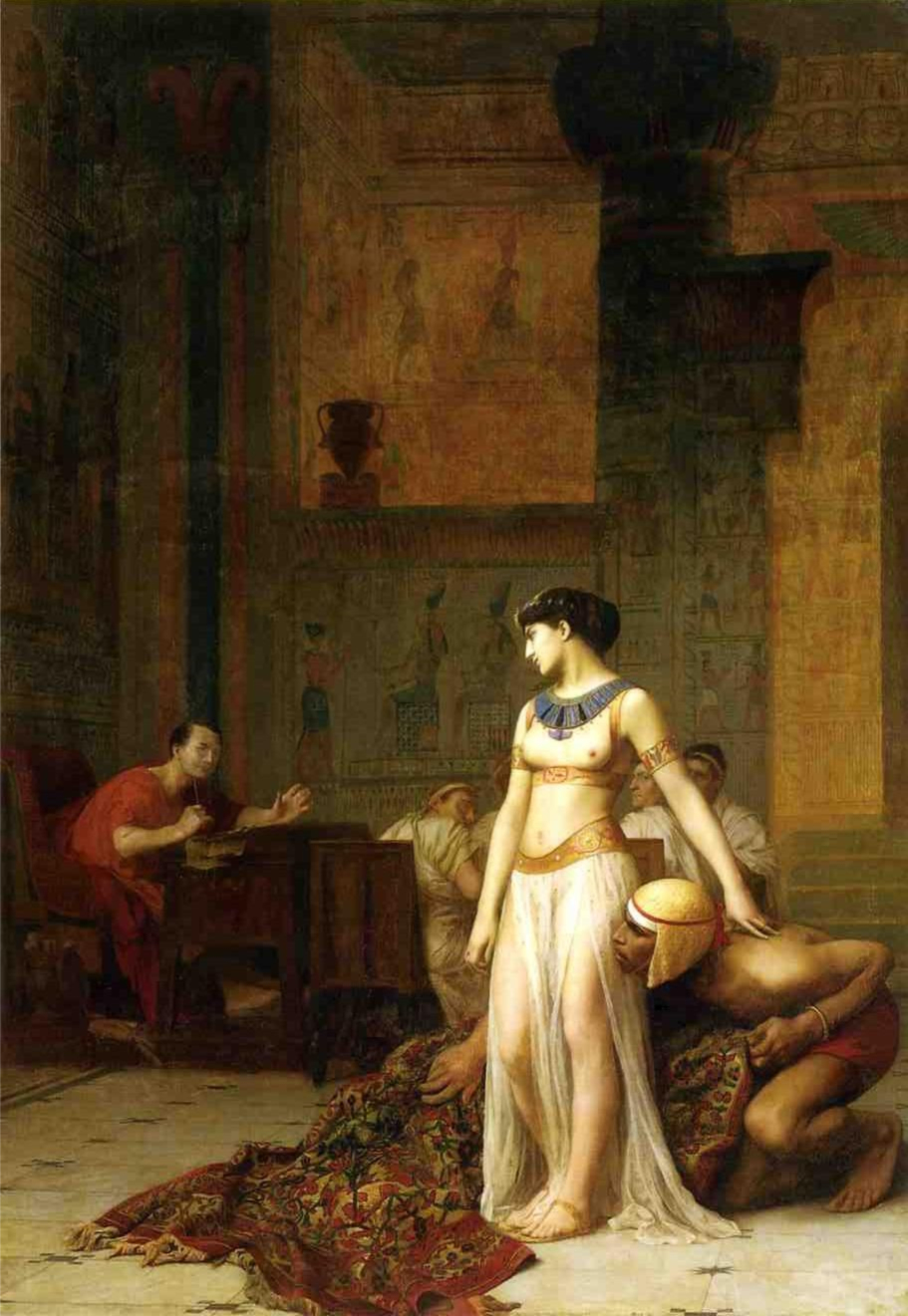
Many researchers, such as Soviet historian S. L. Utchenko, consider Caesar's Alexandrian War a pure gamble, driven only by the "demonic charm" of the Egyptian queen. While not denying her allure, the author still believes that there was political calculation in this alliance—Caesar sought a ruler in Egypt personally dependent on him to ensure uninterrupted grain supplies to Rome. The queen likely understood her significance and sought to extract the maximum from the circumstances. So both combined the pleasant with the useful.
Cleopatra and Caesar had a son, Ptolemy XV Caesarion—"little Caesar." The queen came to Rome, where she immediately earned the public's dislike—it was believed that the Egyptian woman had a bad influence on Caesar and abused his favor. Republicans saw monarchical tendencies in the romance and became even more suspicious of his aspirations for royal power. After Caesar's assassination in 44 BC, Cleopatra returned to Egypt, where she likely poisoned her brother Ptolemy XIV to make her son Caesarion her co-ruler.
In the ensuing war between the Caesarians and the Republicans, she took a dual position—on one hand, she sent a fleet to aid the Caesarians, which, however, was shipwrecked en route, and on the other, she did not interfere with the Roman legions in Egypt coming to Cassius's aid, although she could hardly have prevented them, given the deplorable state of the Egyptian army. In any case, in 41 BC, Cleopatra made every effort to win Antony's favor.
The Alliance of the Queen and the Triumvir
Cleopatra's task was complicated by the fact that in 41 BC, Antony was already married for the third time to Fulvia, with whom he had a warm relationship, and it seems the couple genuinely loved each other. Nevertheless, it was known that Antony had a weakness for women and would not refuse a fleeting affair with the queen. But Cleopatra set herself a much greater goal—to make Antony fall in love with her.
The queen arrived at the triumvir's on a luxurious galley in the guise of Aphrodite. This spectacle impressed Antony, and he indeed fell in love with Cleopatra. The winter of 41–40 BC, the triumvir spent with her in Alexandria, lost to all affairs in a passionate romance.

Meanwhile, discontent with the Second Triumvirate's rule was growing in Rome. Antony's brother Lucius, along with his wife Fulvia, raised a rebellion against Octavian in Italy, fearing that he was sidelining his ally. Antony, to his displeasure, was forced to return to the Apennine Peninsula to resolve the situation. However, even before his arrival, Lucius and Fulvia were defeated at the city of Perusia, giving the conflict the name of the Perusine War. Soon Fulvia died, and in 40 BC, Antony, to strengthen his alliance with Octavian, married his widowed sister Octavia. The triumvirs also redistributed the provinces. Antony was forced to give Gaul to Octavian, thereby completely handing over the western provinces to the latter. Lepidus was effectively removed from power but nominally retained Africa.
Antony could not immediately return to Cleopatra, as his attention was diverted by the Parthian invasion, which he dealt with until 37 BC. During this time, his lawful wife Octavia accompanied him, impressing those around her with her virtue and devotion—the marriage even produced two daughters. Nevertheless, Antony sent his wife back to Rome and, after the military actions, summoned his royal lover to officially marry her according to Egyptian custom. In effect, Antony abandoned his lawful wife and his ally's sister. Appian of Alexandria wrote that "Cleopatra had taken possession of Antony."
Antony then officially recognized his children with Cleopatra—the twins Alexander Helios and Cleopatra Selene—and then transferred to Egypt the control of Cyprus, most of Phoenicia, Cilicia, Nabataea, and Coele-Syria. The benefits for Cleopatra were obvious—the annexation of former Ptolemaic territories back to their kingdom, but from Antony's side, this step seems completely unreasonable and cannot be explained solely by the conquest of Egypt's loyalty.
Antony then embarked on a campaign against Parthia to build on recent military success. The campaign ended in failure—the Roman troops did not achieve success and suffered significant losses. To somehow preserve his reputation, the triumvir defeated Armenia, which had sided with Parthia, and to present his unsuccessful campaign as a victory, he celebrated a triumph, but not in Rome, as was customary, but in foreign Alexandria with Cleopatra. In 35 BC, this triumph took place with all the eastern pomp, and the couple appeared before the Alexandrian crowd in the guise of Dionysus and Isis.
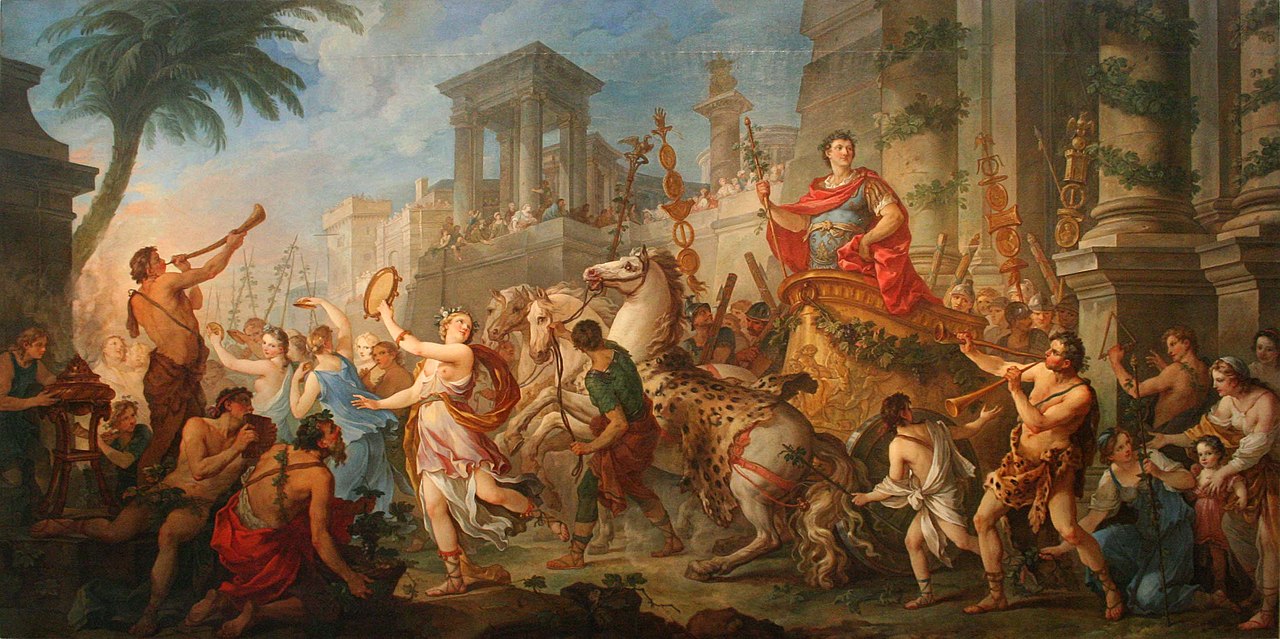
Having remained in the East for years, Antony lost touch with the Roman public. Actively courting the local population, he did not shy away from deifying his power—in Ephesus, the Greeks called him Dionysus, and the Egyptians considered him Osiris. Antony officially recognized Caesarion, Caesar's son by the foreign queen, as the late dictator's heir, and proclaimed his children with Cleopatra as rulers of several eastern provinces. Partly, such a policy was predetermined by geography, as Octavian received the western provinces, where Romanization had advanced significantly further, while Antony received the more monarchical East. Nevertheless, the triumvir was excessively tempted by the East and the Egyptian queen, which Octavian did not fail to exploit.
In his propaganda, Octavian openly accused Antony of plundering the Roman people's property and provinces in favor of Egypt and claimed he intended to move the capital from Rome to Alexandria, as Antony had inexplicably decided to celebrate his triumph in Egypt. Octavian also used the story of his sister for propaganda purposes—the virtuous Octavia, faithful to her lawful husband and raising their children, cast a shadow on Antony's marriage to Cleopatra. Thanks to Octavian's skillful propaganda, the queen appeared to the Romans as a seductress who had bent the once-popular commander to her will.
Antony began to lose supporters and could no longer influence the situation in the metropolis. Even here, Octavian proved himself a calculating politician and declared war not on Antony, but on Cleopatra, leaving the triumvir no choice but to defend the foreign queen.
In 31 BC, Antony and Cleopatra were defeated in the naval Battle of Actium. After the defeat, they fled to Alexandria, where they spent their remaining time in desperate hedonism, organizing the "Society of Inimitable Livers," which included the couple and their servants. In 30 BC, when Octavian's troops approached the city, Antony, receiving false news of Cleopatra's death, committed suicide by falling on his sword. The queen, learning of her husband's death, also committed suicide, according to legend, by allowing a venomous snake to bite her. Caesarion was killed on Octavian's orders, and the other children were given to Octavia to raise.
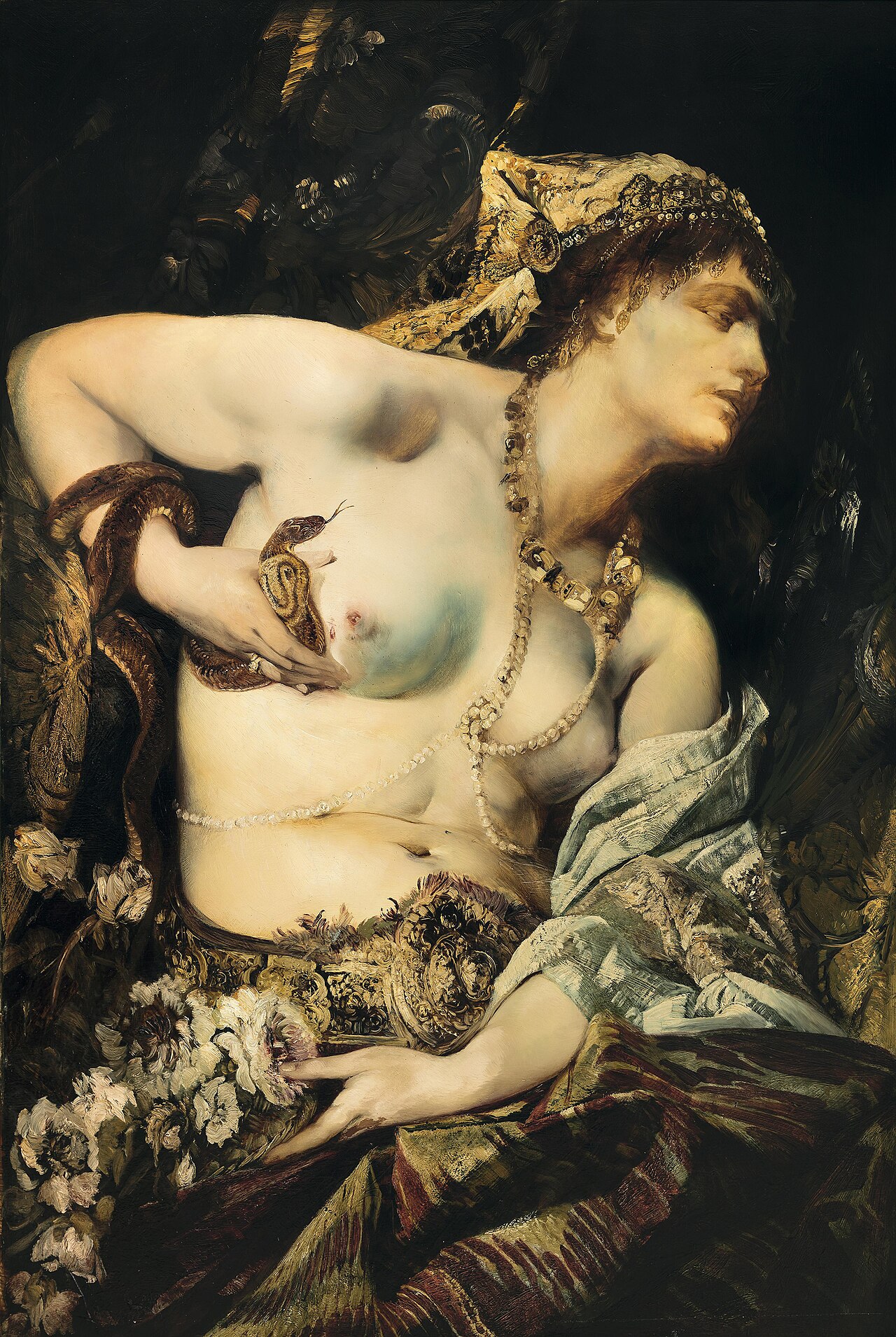
Egypt became a Roman province, and Octavian became the sole ruler of Rome with the title of Augustus. The eccentric and passionate Antony suffered a complete defeat before his cold and calculating rival.
Marriage to a foreign queen proved fatal to Antony's reputation. Cleopatra had already provoked the Romans' anger and suspicions of monarchical ambitions during Caesar's time, and Antony seemed to be repeating the fate of his late patron. Nevertheless, marriage to the queen alone could not be the cause of such a figure's downfall. Playing at being a king and self-deification worked well in the East, but the Romans could not accept such behavior. They were outraged by Antony's monarchical pretensions and his extravagance towards Egypt.
In contrast, Octavian emphasized his "Roman-ness," his commitment to the Roman people's interests and traditions, so his struggle against Antony appeared not as a power struggle but as a battle of Rome against an eastern threat. It can be said that Octavian completely won the information war and played on the national sentiments of the Romans, if the reader will forgive the author such an anachronism.
Romans, accustomed to republican rule, did not accept Antony, who openly imitated eastern kings. They wanted to see a living Republic, and Octavian gave them this illusion in the form of the principate—his own autocracy, carefully disguised as a "restored Republic."
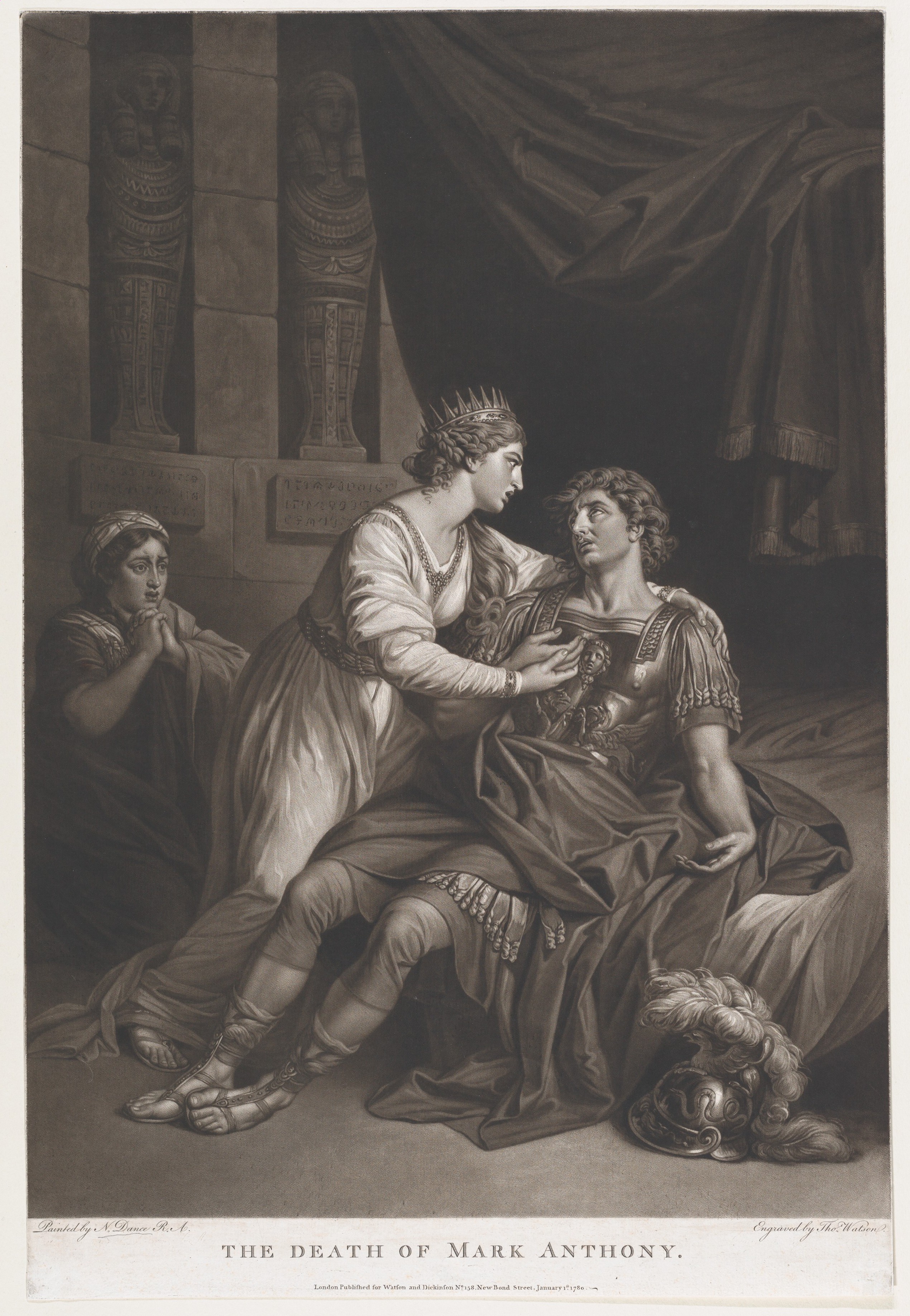
The image of Antony and Cleopatra in Roman historical memory was well summarized by Dio Cassius in his "Roman History":
"Antony was second to none in fulfilling his duty, but he committed many follies; at times he was extraordinarily brave and at the same time often failed due to his cowardice, he was sometimes great in spirit, sometimes insignificant; he seized others' property, squandered his own, forgave some without any reason, and punished many unjustly. Therefore, although he rose from insignificance to omnipotence, from poverty to wealth, neither benefited him, and he, who hoped to become the sole ruler of the Romans, ended his life by suicide.
Cleopatra knew no bounds in either her passion or her acquisitiveness, was ambitious and power-hungry, and was also arrogant and bold. She gained royal power in Egypt through her charms, but hoping to achieve dominance over the Romans in the same way, she miscalculated and lost what she had. She subjected two of the greatest Romans of her time to her power, and because of the third, she ended her own life. Such were Antony and Cleopatra, and thus they ended their lives."
[Dio Cassius, Roman History, LI, 15]
Take the test on this topic

History
Antony and Cleopatra
Fascinated by the tragic love story of Antony and Cleopatra? We invite you to take the quiz!